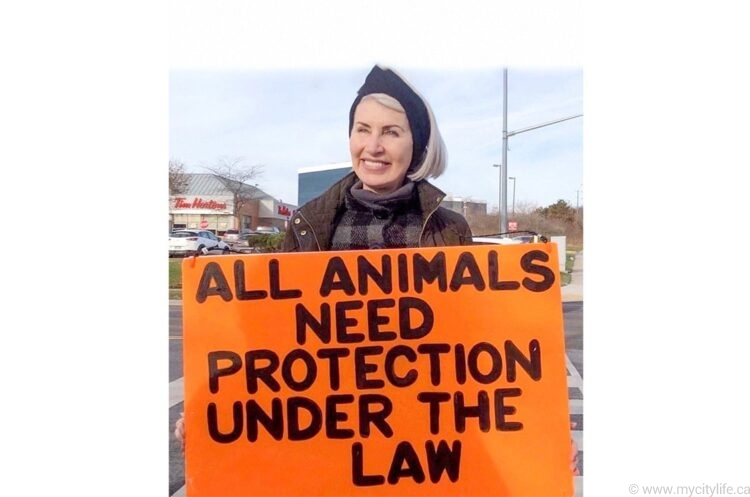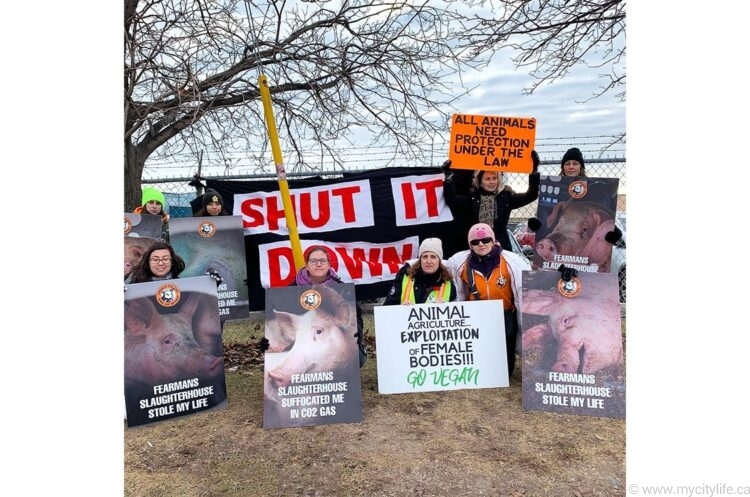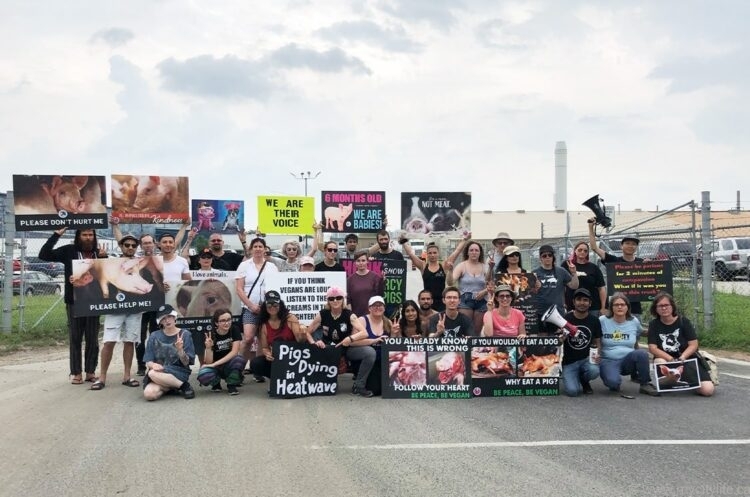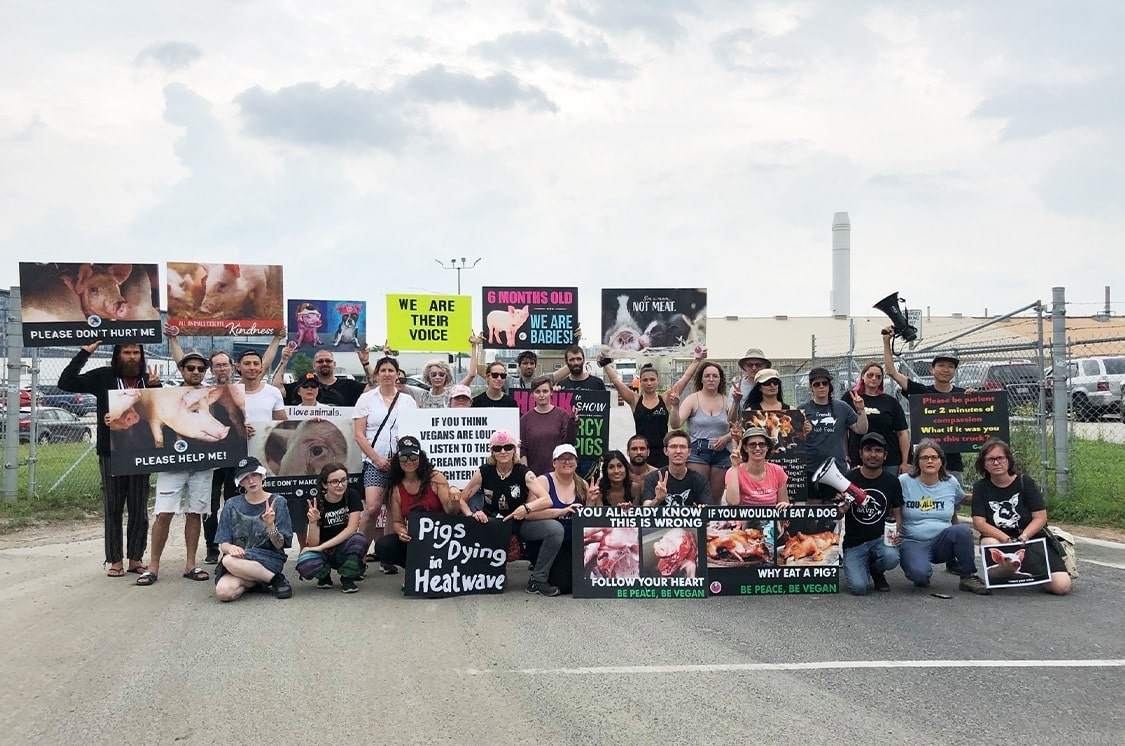Animal Rights Versus Human Rights: When Does One Set of Rights Supersede the Other?
Regan Russell’s passion for animals and her concern for how they were being treated ultimately led to her untimely and tragic death.
Have you ever believed in something so fiercely that you’d be willing to risk your life for it? Meet Regan Russell, a passionate advocate for all things animal-related, who was run over and killed on June 19, 2020, by Andrew Blake, a transport-truck driver employed by Brussels Transport Ltd., who was delivering a load of pigs to Fearmans Pork processing plant, which is owned by Sofina Foods and located in Burlington, Ontario.
The 65-year-old Regan was peacefully protesting Bill 156, the Security from Trespass and Protecting Food Safety Act. The law had been passed by Ontario Premier Doug Ford’s government on June 17, 2020, a mere two days before Regan was killed. Police charged Blake with careless driving, which to many felt like a complete travesty of justice.
“‘I’m going down to the slaughterhouse today,’ Regan told us matter-of-factly that June day,” recalls Bill Russell, Regan’s father, who, at 92, is also an activist. “Advocating for animals is just what Regan did, but she never mentioned how dangerous it was. The animal-processing plants used to allow protester two minutes to approach the stopped transport trucks so that they could provide water to the pigs through the truck slats. The drivers, of course, didn’t like it much because it held them up, so they’d rev their motors. But the group of protesters had timers and when the two minutes were up, they would get out of the way.”
Bill can’t say for sure what happened that June day except for the fact that Regan was killed by the truck Blake was driving.
The remembering is the hardest part for Bill and his wife, Pat, Regan’s mother. “The funeral director told Pat and me that they’d done the best that they could. All we could see was Regan’s head — we recognized her hair — but there wasn’t much else left. It was horrific. And it’s been horrific ever since without her,” Bill says, the quietness in his voice a testament to the kind of grief that is hard to imagine, let alone live with.
“Regan was always there for me,” says Shannon Russell, Regan’s younger sister. “When the chips were down she always defended me.”
When Shannon first heard from Regan’s husband, Mark, what had happened, she didn’t believe it could be Regan. “I thought to myself it could be anyone. And because Regan was the most visible and well-known activist at the pig vigils, I thought it was just presumed to be her. That day is a complete blur to me. I don’t even remember my husband, Jon, coming to my parents’ house. I was in complete disbelief. But then we saw Regan at the funeral parlour, and all I can say is, it was awful.”
From the time she was a child, Regan was crazy about animals. A Toronto native, by the time she was 23 Regan was volunteering in Winnipeg with Greenpeace, the renowned worldwide network of independent organizations founded in Canada in 1971 to expose global environmental issues. She also actively worked to oppose the Canadian baby seal slaughter in the late 1970s.
A teacher with The Kindness Club, Regan worked in Northern Quebec, teaching humane education in schools on First Nations reserves.
“My first protest was the one I attended with Regan at the Eaton’s fur salon in Toronto during Christmas week of 1987. The head of security called the police, who took us in paddy wagons to the central police station in Toronto,” Bill says with a small laugh.
Shaun Monson, an American film director, producer and activist for animal rights and the environment, remembers hearing the news of Regan’s death. “I was in Los Angeles the morning I heard that Regan was killed and I was stunned. How could that happen?” Monson asks.
Funded by a group of private donors, Anita Krajnc, the founder of Animal Save Movement (formally known as The Save Movement), commissioned Monson in 2020 to film and produce a short documentary, There Was a Killing, as a way to inform the public about the events that occurred the day Regan died. Krajnc wanted people to understand the courage and unshakeable dedication it takes for activists such as Regan to bear witness to the conditions that pigs experience on their way to slaughterhouses and processing plants.
“I didn’t know if I could put it together into a visual piece, but how could I say no? A woman had lost her life needlessly,” Monson says.
In the film, Monson describes, based on eyewitness accounts, what that fateful June Friday was like as protester approached the transport trucks to give water to the pigs, actions described by one activist as “moments of compassion.”
“It was a sunny day with blue skies. Regan would have been hard to miss. A former model, she had a full head of white hair and was almost six feet tall,” Monson says. “When I saw some of the footage that was taken that day, the first thing that I noticed was that Regan’s water sprayer was lying at the crosswalk. Regan had been standing there — we have a shot of that – but her body was dragged the full length of the transport, which was about 70 feet long, and her blood trail is evident near the crosswalk and going toward the booth that was inside the plant gates.”
If everyone bore witness, this injustice wouldn’t happen — Anita Krajnc
Seeking clarification around Bill 156, Monson paid a visit to his attorney father, Robert Monson, to get his legal perspective on this Canadian bill. At its heart is the issue of the fundamental right for people to assemble and to enjoy the hard-won right of freedom of speech, he was told.
“There has never been a case like this before, and currently no precedent for this situation,” Robert says in There Was a Killing. “But precedent will be made with this case.”
The intent of Bill 156, as stated on the Legislative Assembly of Ontario’s website, is to “protect farm animals, the food supply, farmers and others from risks that are created when trespassers enter places where farm animals are kept or when persons engage in unauthorized interactions with farm animals. The risks include the risk of exposing farm animals to disease and stress, as well as the risk of introducing contaminants into the food supply.” These animal protection zones are identified as “farms, animal processing facilities and other prescribed premises on which farm animals may be kept or located.”
In fact, a key clause of Bill 156 — one that is specifically meant to keep protesters away from transport trucks carrying livestock to processing plants — is detailed in Section 6 of the Bill: “Section 6 prohibits persons from interfering with a motor vehicle that is transporting farm animals and from interfering or interacting with the farm animals in the motor vehicle without the prior consent of the driver of the motor vehicle.”
The fines that might be levied on protesters and trespassers who contravene the Bill under Section 14 of the Act, including a fine of “not more than $15,000” for first-time offenders and “not more than $25,000” for any subsequent offences, no way defused Regan’s passion and love for animals, a fact that is championed by Krajnc. A former activist who participated in a global Greenpeace action in the Great Bear Rainforest in B.C. (in 1997), Krajnc established Toronto Pig Save in 2010 along with her adopted beagle, Mr. Bean, whom she lists as a co-founder.
“After I got Mr. Bean, we would walk along the lakeshore and during the morning rush hour we would see seven or eight trucks transporting pigs. The pigs’ snouts would be sticking out through the slats in the trucks and they looked so scared. Seeing these beautiful animals in distress made me realize that I wanted to do something to actively help them, to save them. And so I founded Toronto Pig Save.”
With a master’s degree in political science and environmental studies and a PhD in politics, Krajnc is an intelligent and committed activist who knows how to advocate for causes she believes in. Her research into how pigs are slaughtered and processed only heightened her passion and compassion for these animals.
“For the first six months after I established Toronto Pig Save I, along with others, did some undercover investigation. We’d go along the railway lines where there were windows that opened onto the pen area and the kill floor,” Krajnc says. “The pigs were squealing their heads off at 112 decibels while being jabbed with electric prods, along a corridor that was closed off so they couldn’t escape. It was brutal to see these animals so terrified and abused. They were herded two and three at a time into an elevator that was lowered into the basement, where they were then poisoned with carbon dioxide. But these gas chambers don’t actually kill the pigs, they only stun them — the processing plants want the pigs alive so their hearts can continue to pump the blood after their throats are slit and their bodies are hung upside down.” Krajnc took video footage and posted it on social media platforms to show the public the brutal ways in which these animals are slaughtered for human consumption.
In 2011, Krajnc started her Toronto Pig Save three-times-weekly “bearwitness vigils,” where she and other volunteers would stand outside slaughter plants and offer water to pigs through the parallel guard slats of the transport trucks.
“Our vigils helped build the movement to save pigs,” Krajnc says. “At first people didn’t want to go to the slaughterhouses, as they thought it would be too upsetting. But within a few months, after they saw their friends joining our vigils, others decided to join us. People came from out of town, from places like New York City, and then a group in Australia heard about us and started their own movement called Melbourne Pig Save.”
While at first the public might have perceived the actions of these pig activists as those of a sort of out-there fringe group, what started out as a singular movement grew within the first five years to 35 groups, and has now spread to hundreds of groups throughout the world, including in Colombia, New Zealand, Argentina, India, Germany, the Netherlands, the United Kingdom and Uruguay.
In fact, public support for pig activists has been so strong that after Krajnc was charged with criminal mischief in 2015, for giving water to pigs that were in a transport truck waiting to drive into a slaughterhouse plant, two lawyers, James Silver and Gary Grill, worked pro bono to win her 2017 acquittal.
There is no denying that Regan’s death has had a significant impact both nationally and globally. On the first anniversary of her death, vigils in her memory were held across more than 60 cities as far away as New Delhi, Rome and Buenos Aires.
A specially designed Canadian commemorative postage stamp with Regan’s photo and the legend “Go Vegan for Regan” was also effected by Adrienne George, who described herself as having been an “armchair activist” until she became a weekly slaughterhouse protester after Regan was killed.
And while it wasn’t just animals that Regan advocated for — she and Bill had participated in a protest against Bill Cosby in Hamilton, Ont., over his abuse of women — it was animals that were uppermost in her mind.
To that end, and as a testament to Regan’s memory, on Dec. 5, 2020, Bill wrote a letter to Premier Ford begging him to repeal Bill 156.
His letter states, in part:
“On June 19th, 2020, my beloved daughter Regan Russell lost her life during a protest against the passing of the Trespass and Protecting Food Safety Act, a.k.a. “ag-gag” Bill 156. She dedicated her life to ending animal oppression and her life was so unjustly taken in the process. The Bill passed despite warnings from dozens of legal experts from across the country that the legislation is unconstitutional and violates rights to free expression and peaceful assembly.
“I plead with you on my 92nd birthday on December 6, 2022, to repeal the Security from Trespass and Protecting Food Safety Act in memory of vegan activist Regan Russell.”
Of course, as with any controversial issue, when passions and perspectives collide, there are other opinions, other rights that need to be considered.
Keith Currie, past president of the Ontario Federation of Agriculture (OFA), an organization that is one of the main agricultural stakeholders behind Bill 156, states that the agricultural industry was looking for clear lines around protecting livestock owners and livestock transportation companies from increasing and aggressive activism.
“Bill 156 is about that important balance between giving protesters the right to protest but also giving the justice system, the court system, and the police system the tools they need to help look after farmers’ livestock and properties, livestock transportation companies, abattoirs, and meat processers from trespassing and harassment, as well as protecting the safety of food,” Currie says. “Bill 156 addresses this in a meaningful way because not only are we farmers, this is where we live, this is where our families live, this is where our employees work, and this is where are our livestock graze — there are a lot of biosecurity protocols involved that are under threat with protesters who trespass and breakand- enter private dwellings.”
Currie unequivocally states that what happened to Regan was an extremely unfortunate accident and a tragic outcome for her family and friends. He also states that he absolutely supports people’s right to peacefully protest, but that there is also a lot more going on under the surface that people who live in urban areas might not understand.
“It is about fairness on both sides,” Currie says. “The bottom line is some of these protests are not about animal husbandry, but rather that protesters want people to stop eating meat. I don’t care whether a person wants to switch to a plant-based diet rather than eat meat — I am a farmer, I grow plants, too — but it is not fair to inflict personal opinions onto agricultural stakeholders and then create a scene around a farm because you don’t like eating meat. Protesters are typically from urban areas and they don’t have an understanding of what is actually proper animal husbandry, or of the impacts they are having when they stomp through our fields, such as our sunflower fields in the summertime. Their footwear often carries weeds and invasive species on their soles, which are then introduced onto our properties. In all seriousness, where else can you just walk onto another person’s property uninvited and make what are ultimately false claims? Bill 156 was introduced to help address the situation without removing the right to protest.”
In June of 2022, two years after Regan died, her partner, Mark Powell, filed a $5 million civil lawsuit over her death, naming Andrew Blake, Brussels Transport and Sofina Foods as co-defendants.
The lawsuit alleges that “negligence on their collective parts led to the death of Regan, including that the driver failed to keep a proper lookout and made an unsafe and improper turn; that Brussels Transport failed to take steps to ensure the driver was competent; and that Sofina Foods failed to provide safety for pedestrians around Fearmans.”
As well, Pat, Bill and Regan’s sister, Shannon, are launching their own $3 million lawsuit.
The hope of Regan’s family, her partner, Mark, and the thousands of Regan’s supporters who were impacted and influenced by her activism and advocacy is that the actions of Blake and the culpability and accountability of Fearmans Pork processing plant and Sofina Foods will come under the microscopic scrutiny that Regan’s death deserves.
Regan’s spirit lives on in the hundreds and hundreds of people she has touched, many of whom she had no idea she had influenced from afar.
“We have a Facebook page called Go Vegan 4 Regan, and on it we’ve been inviting people to write letters for Bill’s birthday, which is in early December, and that Christmas greetings be sent to Bill and Pat,” says Krajnc, who has become a close friend of the Russell family. “Regan’s loss has been extremely difficult for Bill and Pat because Regan lived with them and took care of them. It was a rare and incredibly loving relationship. And so to know that the international community is thinking of them and sending their love is important because they feel that Regan is living through these people. In fact, a number of people have become active organizers because of Regan and, as such, they are saving a number of animals’ lives, including dozens and dozens of lambs, goats, chickens and pigs who have been rescued in her name.”
Heartwarmingly, Bill reports that he and Pat have received cards and letters from across the globe, including from Uruguay, Mexico, Scotland, Germany and the country of Georgia, to name just a few.
There is no question that it is difficult to embrace a lifestyle that is so different from the one that many of us are used to — Sunday family get-togethers marked by roast beef dinners dripping in beef gravy, steaks on the grill on balmy summer evenings — but there are ways to ease into a plant-based diet for those who are interested in embracing a new kind of lifestyle.
“A fair and just plant-based food system allows us to build a brighter future and tackle the climate, ocean and biodiversity crisis in a meaningful way,” says U.K. activist Nicola Harris, Animal Save Movement’s communications director. “We can prevent future pandemics and major health crises as well as stop the untold suffering of and violence against trillions of sentient beings. Regan’s passing lit a fire inside of me; her death was a huge loss to the animal justice movement. Her courage and long history of activism inspired me to do more to continue her fight — she cannot have died in vain.”
It is not fair to inflict personal opinions onto agricultural stakeholders and then create a scene around a farm because you don’t like eating meat— Keith Currie
Harris suggests that an easy way to get started on a vegan diet is to sign up for a free program such as Veganuary, Veguary or Challenge 22, with a whole community’s support of resources and tools.
“Many of the foods we eat can simply be swapped for plantbased versions, and ultimately it provides a great opportunity to try new cuisines. As well, eating a healthy whole-foods diet can improve gut health and reduce inflammation as well as lower the risk of developing Type 2 diabetes, heart disease and some cancers. Studies have shown that a whole-food plant-based diet is linked to healthier moods, high productivity and boosted energy levels,” Harris says.
Before Blake pleaded guilty, Currie said that he believed that the outcome of the charges against the driver would depend on how the presiding judge viewed the circumstances of what happened and whether Bill 156 would be interpreted in light of the sensitivity surrounding the events that transpired. “The driver didn’t see Regan — she was on the side of the truck where she shouldn’t have been,” Currie says. “Regan was a lifer as far as activism goes. Should she have known better? I don’t know,” he added. “I talked to some people who know the company that the driver worked for — they said he was absolutely devastated by the accident. That is why it was so important to include the livestock transportation industry as well as the processors under Bill 156.”
Pat says that Regan firmly believed that “where women can speak up and protest, animals cannot — we are their voice. Regan used to say, ‘I’m trying. I don’t know if it does any good, but I know doing nothing does no good, either.’ And so Bill and I had that engraved on Regan’s headstone.”
In a Feb. 1, 2023, letter Premier Ford sent to Bill and Pat he writes that, being a father of four, “I can only imagine the suffering you’ve endured. While I know there are no words that can ease the pain, I do hope you find some comfort in family and friends and the memories of Regan that you hold dear in your heart. I welcome your insight, and have shared your letter with the Honourable Lisa Thompson, Minister of Agriculture, Food and Rural Affairs. Minister Thompson or a member of her team will respond to you as soon as possible.”
Blake appeared in court on March 27, 2023, and pleaded guilty to the charge of one count of careless driving causing death under the Highway Traffic Act. He was fined $2,000 and sentenced to one year probation, during which time he is permitted to operate a vehicle only for work and to get to and from his job.
What the video evidence had ultimately shown was that the driveway into Fearmans slaughterhouse plant sloped downward, and that Regan was standing at the lower part of the gradient, holding her hand up to indicate “stop.”
“She wasn’t visible to the driver, whose hood and windshield was apparently obstructing his sightline and thus blocking his view of Regan. The driver admitted that what he had done was wrong, but he stated that he didn’t see Regan because of the road’s gradient,” Bill says. “So how can you fight the fact that the two individuals involved didn’t see each other?”
“I just wish that someone would take responsibility for the impact that Regan’s death has had on all of our lives,” says Shannon. “And the shock! My mom and dad and I have talked about dealing with the shock. People can tell you what it is like, but until you actually go through it you just don’t know what pure hell really feels like.”
If there is one comfort from Regan’s tragic death, Bill has found it.
“Regan’s death has energized interest in animal rights all over the world,” he says. “I think now it is more important for Pat and me to expend all of our energies on what Regan wanted, which was to stop the oppression of animals and repeal Bill 156.”
Bill poignantly observes that now the animal rights statement of “Justice for Regan” needs to be changed to “Justice by Regan” — “because of all the animal-rights converts she’s made who haven’t known her and who are carrying her torch.”
Sofina Foods did not reply to requests for an interview or comment.



















































































